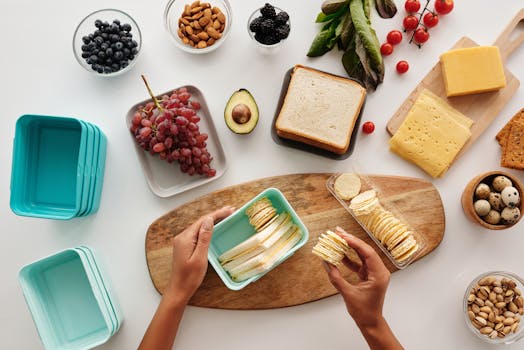Eating healthier doesn’t require big changes. In fact, small adjustments to your daily meals can make a huge difference. Simple tips can help you enjoy more nutritious, satisfying, and tasty meals. Moreover, these habits support long-term health and wellness. In this article, we’ll share ten practical ways to make your meals healthier.
1. Plan Your Meals Ahead
Planning meals in advance prevents unhealthy choices. For example, create a weekly menu and grocery list. Additionally, planning saves time and reduces stress on busy days. Over time, meal planning helps you maintain a consistent healthy eating routine.
5 Easy Healthy Meals to Boost Your Energy
2. Add More Vegetables
Vegetables are low in calories but high in nutrients. Fill at least half your plate with colorful veggies at every meal. Furthermore, adding vegetables improves fiber intake and supports digestion. Also, they add flavor, texture, and variety to your meals.
3. Choose Whole Grains
Switch white rice, bread, and pasta for whole-grain options. Whole grains stabilize blood sugar, keep you full longer, and improve digestion. In addition, they provide essential vitamins and minerals. By making this swap, you’ll enjoy more energy and better overall health.
4. Limit Added Sugars
Reduce sugary drinks, desserts, and processed snacks. Instead, use natural sweeteners like fruit, honey, or maple syrup. Additionally, cutting sugar protects your teeth, metabolism, and long-term health. Over time, you’ll also notice improved energy levels and mood.
5. Drink Plenty of Water
Hydration is key for digestion, energy, and overall wellness. Aim for at least eight glasses per day. Also, drinking water before meals can reduce overeating. Furthermore, water supports clear skin, proper metabolism, and overall vitality.
6. Cook at Home Whenever Possible
Home-cooked meals let you control ingredients and portion sizes. By cooking at home, you reduce processed foods, unhealthy fats, and excess salt or sugar. Additionally, cooking can be fun and creative. Over time, it helps you develop healthier eating habits.

7. Include Healthy Fats
Incorporate foods like avocado, olive oil, nuts, and seeds. Healthy fats support heart and brain health. Moreover, they help you feel full and satisfied after meals. By replacing unhealthy fats with these options, you improve both taste and nutrition.
8. Practice Portion Control
Use smaller plates and listen to your hunger cues. Portion control prevents overeating and supports weight management. In addition, it allows you to enjoy treats without guilt. Also, controlling portions helps your metabolism function efficiently.
9. Choose Smart Snacks
Instead of chips or candy, opt for fruits, nuts, or yogurt. Healthy snacks keep energy steady between meals. Additionally, they prevent overeating at main meals. Over time, smart snacking builds better nutrition habits and supports overall wellness.

10. Experiment with Herbs and Spices
Enhance flavor naturally with herbs and spices. They reduce the need for excess salt or sugar while adding antioxidants. Also, experimenting in the kitchen keeps meals exciting and flavorful. By trying new herbs, you’ll make healthy eating more enjoyable.
Conclusion:
Making meals healthier doesn’t have to be complicated. By planning, adding vegetables, choosing whole grains, limiting sugar, staying hydrated, cooking at home, including healthy fats, controlling portions, snacking smart, and using herbs, you can improve your nutrition easily. Therefore, start implementing these tips today. Over time, your meals will be more nutritious, satisfying, and beneficial for your overall health.
https://www.instructables.com/How-to-use-herbs-and-spices-in-cooking
